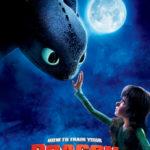Safe Fiction Is Dangerous (Or, A Review Of How To Train Your Dragon)
 A few years ago I saw How to Train Your Dragon, the first installment, as it turns out since How to Train Your Dragon 2 is due out in a few days. The original is a wonderful, fun, well-executed, “safe” production.
A few years ago I saw How to Train Your Dragon, the first installment, as it turns out since How to Train Your Dragon 2 is due out in a few days. The original is a wonderful, fun, well-executed, “safe” production.
The main themes involved parent-child relationships and being true to oneself. Good things, for the most part. There was even a touching moment when the dad tells his son he’s proud of him.
I can see parents happily taking their children to see this movie and its sequel and feeling oh, so good about it. I know I felt uplifted when I walked out of the theater.
But here’s the thing. There are some side issues that parents would be wise to think about and to discuss with their children, yet many may draw the false conclusion about the movie because of its happy ending and the reconciliation achieved, father with son and humans with dragons, that there are no ideas that may need to be questioned.
Here are some of the those issues, most tangential to the main point.
- The decision not to kill a dragon (animal rights?)
- The existence of a “greater evil” than the one the humans saw (big government? big business? God? Satan? Who is the greater evil extorting the “dragons” today?)
- The attitude toward war. (Father: They’re killing hundreds of us. Son: But we’ve killed thousands of them. They’re just defending themselves.)
- Be true to yourself. (No matter that your true self is sinful?)
Am I saying How to Train Your Dragon is a bad movie and people should smash the DVD they bought and boycott HTTYD 2? Hardly! I loved the first movie (and hope to love the second) and would recommend it to anyone. It’s family friendly, but it’s artistic, too. At times I thought I was seeing an animated version of Avatar (an animation of an animation—now if that doesn’t say something about the digital revolution).
What I am saying is that “safe” fiction is the most dangerous kind because people are disarmed, no longer alert to possible ideas that may foster a false worldview.
Ideas, of themselves, are not dangerous. I could, and did, listen to atheist Christopher Hitchens in a debate about the existence of God and was unaffected by his worldview because I was alert to his worldview.
Ideas that float in under the radar, however, are another thing. They enter our minds unchallenged, co-exist with the truth, and someday, after they’ve been fortified, may even challenge the truth to a shootout.
For the last thirty years at least, broadcast media as well as print media has taken this “under the radar” approach as a means to introduce a shift in worldview through “safe” stories. In fact, stories like those depicted in Glee and other “harmless” TV programs validate a belief and lifestyle that contradicts Scripture.
But the reality is, “safe” Christian fiction is no more safe than the media brand of safe.
For example, I read one book put out by a Christian imprint that was all about lust. However, the heroine refused to marry the hero (because he wasn’t a Christian), but she didn’t refuse his kisses and didn’t stop dwelling on them or longing for them or becoming aroused by them. The story came to one titillating climax after another (pun intended). But it was safe since it had no bad words and no bedroom scenes.
 That book purposefully stretched the normal boundaries (the author called it “edgy”). What about those stories that are in the Christian fiction sweet spot, Amish romance? Does anyone know or care how Christian the Amish actually are? Are these books addressing legalism? (I’m asking, because I haven’t read any.) Church divisions? (Amish churches have divided over whether a woman’s dress must be double-breasted or not, whether or not a hook-and-eye is acceptable, and many other such particulars.) Or is there an underlying assumption that whatever the Amish do is good because of their safe externals?
That book purposefully stretched the normal boundaries (the author called it “edgy”). What about those stories that are in the Christian fiction sweet spot, Amish romance? Does anyone know or care how Christian the Amish actually are? Are these books addressing legalism? (I’m asking, because I haven’t read any.) Church divisions? (Amish churches have divided over whether a woman’s dress must be double-breasted or not, whether or not a hook-and-eye is acceptable, and many other such particulars.) Or is there an underlying assumption that whatever the Amish do is good because of their safe externals?
More importantly, are readers asking questions about the pastoral culture they lose themselves in? Or are we letting our guard down? Because these stories are about a group of Christians. And Christian companies are publishing them. And Christian bookstores are selling them.
As I see it, if “safe” fiction makes us drop our guard, then it is the most dangerous fiction of all.
– – – – –
This article, not specifically about Christian speculative fiction but applicable to it, first appeared, minus some editorial changes, at A Christian Worldview of Fiction in July 2010.









































I think it’s the Christian’s duty to never drop his/her guard, and your article makes this even clearer! We need to be reminded of it on a regular basis. Evil is all around us, and I could not agree with you more … the things that make us laugh or make us look twice or make us so entertained that we forget about their deeper meaning or agendas – those can be (can be, not always!) the most dangerous of all. “Above all else, guard your heart, for everything you do flows from it.” (Proverbs 4:23) Thanks for the inspiring words, Rebecca!
Thanks, Ashlee. I sometimes take for granted that others see the importance of thinking critically about our stories, but this series has made it abundantly clear that this is not always the case. I appreciate your feedback.
Becky
“It’s a two-hour movie. He may not be asleep, but he will be sheeple, because it is impossible to enjoy something and be critical of it at the same time. But we have to go deeper. One layer of movie is not enough; it will have to be a movie within a movie to ensure that he is befuddled enough to think run-of-the-mill animal rights will overtake human rights until veganism is legally mandatory. This is difficult, but this is Inception.”
BBBWWWWWAAAAAAAAAAAAAAAAAAAAAAAAAAAAAAAAAAAAMMMMM.
http://youtu.be/imamcajBEJs
I think you’re teasing the animal rights thing — that being concerned about animal rights themes is ridiculous.
The examples are political rather than religious — big government, anti-war, animal rights. Sometimes mainstream liberalism could carry messages contrary to the Christian worldview (as could conservatism in other ways), but most of the time I think politics is irrelevant.
I think “let’s find another way to deal with [problem animal] other than killing it” is just too basic of animal rights’ junk to be worried about the far-off extreme of humans are scum, kill us off. I’ve run across sites where people bitch about using bits and treed saddles on horses and even a site where they favor phasing out domesticated animals entirely, but the kind of rhetoric they use is mostly the squisher-feels kind and not as scary as some 2nd Amendment weirdos I’ve seen (*coughOpenCarryTexascough*).
And I just don’t really understand why animal rights are supposedly antithetical to Christianity. Or how global warming stuff is supposedly antithetical to Christianity. Methinks it comes from conflating “Republican” with “Christian” more than anything else.
Notleia, I don’t doubt that there are some people who conflate a politically conservative position with Christianity. Of course there are people like our President who hold their liberal positions based on their interpretation of Christianity, too. I don’t know that the Christianity of either is Biblical, however. There are lots of people who profess Christ, but who are far from Him in their hearts.
The deal with “animal rights” is this: God created humans in His image and breathed the breath of life into us—i.e. He gave us a soul. We are different from the animals in two ways, then. First, we have God’s image and second we have a soul.
Those who hold to a worldview that puts us on an even playing field with animals do not recognize either of those facts. I suspect it starts with a denial that God is, and that’s the real issue. But even if they think there is a God, they are repudiating His revelation, and that’s a problem too.
Not that those worldviews are something to fear, but the point of this article is, when we are unaware of the worldview a story is putting forward, we are much more inclined to embrace it without reflection.
Wisdom, I suggest, is to keep our eyes open and our minds working.
Becky
Matthew Scully’s Dominion is a Christian argument for animal rights. Most of the arguments against either animal rights or global warming from Christians tend to be secular or pragmatic, as opposed to religious. Like it’s simply not workable to demolish factory farming or stop global warming; the cost of the measures needed to do so are too great for our economy to bear.
A lot of political issues Christians can disagree on with no harm done though.
I agree with you. I don’t know what else to say. I’ve had too many arguments of this nature on Mike’s blog. 🙂 Hollywood et al is always pushing agendas under the radar to passive viewers.
Agree, Jill. I’ve had the same discussions at Mike’s blog. And I find it ironic that he posted today about Christian worldview. I’m still not sure what he’s trying to say in that post. It sounded like, Hold the Christian worldview so it isn’t too extreme. But as you say, no one’s telling Hollywood to hold the animal rights message or the gay rights agenda or relativism or a variety of other pet causes. Why are Christians alone supposed to back off from truth claims in stories?
And for clarification (because there may be someone who doesn’t know what I believe about this), what a story says needs to be crafted as well as the plot is crafted or the characters are crafted. The choice isn’t between an overt theme and no theme. It’s between a well-executed theme and a poorly-executed theme. (And I put stories in which the theme supposedly seeps into the telling as poorly executed, though I suppose there is the rare exception).
Becky
How to Train Your Dragon is like Black Beauty. Sure, it had an agenda … but HTTYD was almost a retelling of that kind of animal rights story. Be nice to the dragons! That Toothless strongly resembles a cat matters not. 🙂
I agree that worldviews can sneak in and take us unawares. But is it really so hard to figure out? My brother was very disappointed in the Malificent movie, because it’s a women’s lib story. Malificent is made to be evil by the Evil Man. The twist at the end shows the superiority of Woman to Man. Yet we gobble up this sort of worldview.
Anybody know the worldview of The Fault in our Stars? I’m not going near that book/movie. I don’t do *sob* stories about *sob* people dying of *sob* cancer.
I hadn’t heard any thing about Malificent yet. Interesting. It seems to me that movies are becoming more overt in their support of certain liberal positions. I wonder, as I think about this, if they aren’t more prevalent and overt because they are finding acceptance in the culture at large. For example, Christianity was never more overt in its place in society than when it was either mandated (Roman empire) or held to be true by the majority of the community (too many examples to name).
If this is the case, we can probably expect more stories that challenge Christian mores and promote godless ones.
Becky
It’s not particularly a bad worldview in The Fault in our Stars. Your basic secular story with a “sometimes stories don’t continue the way we want them too” idea. It’s not really that good of a story, though; Green writes like second-rate Douglas Coupland, and he doesn’t seem to want to embrace the power of the idea. It feels curiously shallow and glib. The book I mean.
It’s getting a lot of buzz more because he has a fandom comparable to Twilight fans, the nerdfighters. Lurlene McDaniel made a career out of writing books about girls with cancer, and Green probably isn’t as good at it as she was.
I wouldn’t rate as one of my top ten, for sure, but it does have some good quotes in it. More importantly, it’s only one book. McDaniels has so many books about people with cancer that I couldn’t tell them apart.
Just as long as we don’t confuse “discernment” with “bashing.” Or even “overly harsh criticism.
Discernment, if it’s measuring the thoughts and ideas put forward in a story with the truths of the Bible, should look quite different from bashing. I think bashing or overly harsh criticism stems from looking at a story’s outward appearance. Some people criticized Avatar, for instance, because the women were scantily clad. At the same time, they ignored worshiping nature and becoming one with the life force and a host of other eastern mysticism elements.
Harry Potter suffered from the same treatment–a look at the externals. Discernment is more concerned with what beliefs a story is putting forward. And discernment is only concerned with turning on the light so that people see the beliefs in light of Scripture.
Becky
I’d suggest getting this on a t-shirt, but it doesn’t really work, so maybe as a bookmark or bookplate?